#medical admission
Text
A battle between Australian medical schools and its prospective students: a thesis on late-stage capitalism
So this is a bit personal, but another reason why I wanted to start writing more was to refine my skills to communicate in an articulate manner.
You see, I have spent the past 7 years working towards becoming a doctor. To become a doctor, you must complete medical school. To get admitted into postgraduate medical school, you must successfully sit an interview. To be offered an interview you must do well in your studies at the undergraduate level and the medical school entry exam (called the GAMSAT).
I am still stuck on step 1.
And I attribute my situation to late-stage capitalism.
I grew up in a family with four children and ancient parents - a bit abnormal in these times. Nonetheless, my father has worked in manual labour jobs for all of his life and my mother has been a stay-at-home mum for almost 30 years. It's safe to say we come from a lower socioeconomic background - my parents are first generation immigrants, where their parents immigrated to Australia and my parents were born in Australia.
My parents have done the best they can. They saved every single cent they could to send my siblings and I to Catholic schools (private school-like education for lower prices) and still struggled to get by despite receiving monetary benefits, fee remissions and their children relying on second-hand uniforms and textbooks. Yet they still cannot afford to retire with my father aged 71.
You get the picture - we're kinda poor.
Being the only child to set their sights on something as prestigious as medicine, I was never aware of the bureaucracy behind the process of getting into medical school - and even beyond that. So as a result, I attended an under-represented school in a rural area, where the sole focus was not on education but also on extra-cirricular activities.
This was never an issue for me until I attended university. It turns out going to an under-represented school allowed me to still get into my desired course with lower scores through a Special Consideration Scheme. It was then that I came to learn that I did not fit into my cohort.
Surrounded by those who attended the best (and most expensive) schools in Victoria, Australia or even the world, everybody had a better understanding of scientific concepts than me - because they were taught these in detail in secondary school. I then came to realise just how disadvantaged I was in this cohort. I struggled during my course, scraping passes and even receiving half-decent scores - just not ones that looked stellar enough for medical schools.
Therefore, I was already disadvantaged for not being wealthy enough to attend a secondary school where education was the prime focus when I began my undergraduate course. This was one part of the equation where capitalism let me down.
The second part was the GAMSAT.
The Graduate Medical School Admissions Test (GAMSAT) is a six-hour long exam divided into three sections - a social sciences/comprehension section, a writing section and a biological sciences section. Sounds disgusting, right?
I have sat this exam 5 times. Each sitting cost $518 (or $618, if you incurred the late fee like me one time). This amounts to $2,590 ($2,690 for me and my stupid late fee). I have had to pay this amount because I have not received competitive enough scores for medical school admission. This is because I also refuse to pay for additional study resources sold by external "GAMSAT companies" because I think it's disgustingly overpriced and overrated. I mean, why would I want to spend $2,500 on an 8-week intensive course??
So here I am left with my own brain, my own study techniques and friends who are kind enough to help with my studies for free. And thus I face another obstacle because I don't have the means to spend money on external GAMSAT courses that *could* benefit me.
The second part to the GAMSAT is that the company who hosts it is not transparent about the content on the exam. There are limited practice exams and questions from the company itself, which funnels prospective medical students to pay GAMSAT companies for extra resources to study. This also makes it incredibly frustrating for trying to improve - you are given no information on what will be on the exam, no feedback on how you went or what questions you got wrong and extremely limited materials from the official company. What a desirable combination for doing well on an exam.
While I sit here, scratching my head for how to improve on the GAMSAT, my friends from university who went to the reputable private schools and were taught critical ways of thinking that are perfect for these types of exams, and able to afford to purchase additional GAMSAT resources, receive highly competitive scores and are given a higher chance of being accepted into medical school.
For a discipline that places value in high morals, ethics and integrity, the system for medical admissions is built entirely on the unethical desire to profit. Like a jewel thief, it steals the money right out of our pockets under the guise of "prestige" and "it's supposed to be a hard journey to get into medicine!". And sadly, it only greatly benefits the ones who were wealthy to begin with, creating a malicious cycle of generational wealth and a larger gap between the rich and poor.
1 note
·
View note
Text
How Northern Cyprus stand out from other countries regarding MBBS?
0 notes
Text
Looking for the MBBS Admission Consultants

Looking for the best MBBS Admission Consultants? Look no further than us! We are a leading company specializing in providing admission consulting services for students wishing to pursue MBBS courses. We have a proven track record of success and our team of experts will guide you through the entire admission process, from start to finish.
1 note
·
View note
Photo

Not Only The Medical Education Cost Is Low, But Also The Living Cost Is Low. If We Talk About Medical Admission In Poland It Is a Very Easy Process To Get Admission In Poland
0 notes
Text
Ok Wild Angsters, you wanted a continuation, so here you go :)
Four already knew what he would be walking into. His phone had been blowing up for hours. He’d come in to work early. Whether he was assigned to take care of Wild or not was another matter - Vaati loved to try and take all the admissions, convinced he was the best nurse on the unit. If Four could just keep Vaati out of Wild’s room, he’d consider it a success.
When the charge nurse told him he would be admitting the trauma alert, he knew who he was getting.
Pre-admission jitters always made Four anxious, but this was an entirely other level of fear. He almost wanted to request a different assignment, but it was too late now. What if he couldn’t take caer of him because he was his friend? What if that impair his decision making? What if he just wasn’t skilled enough to handle it? He knew Ezlo wouldn’t give him an assignment he couldn’t handle, wouldn’t be there to support him, but still…
Four went over the supplies in his room once more. Safety checks were fine—they had suction, they had a bag valve mask, the code card was nearby—and he had all the supplies he needed. It was just a waiting game.
Four paced the unit at least three times before he looked at the OR status board again. Wild was still in surgery. He poked in his chart, glancing at injuries, looking at vital signs and anesthesia notes. The last update he saw was that Wild had gotten another unit of blood. Estimated blood loss so far was around 2200mL.
2200mL. That… wasn’t too terrible, Four supposed. He’d… seen worse.
Please don’t get worse.
Four knew for certain that Wild had been mass transfused in the ED. Warriors, his primary nurse when he was there, had told him as much. Between that and the multiple blood products he’d gotten in surgery, as well all the crystalloids he was likely getting as well…
Four took a breath. Then another. He grabbed his phone, texting Warriors. You doing ok?
Wars didn’t reply.
Four wasn’t entirely sure where everyone was at this point. Hyrule had stayed at the hospital, lingering in the emergency department and then the operating room waiting area, but Four hadn’t seen him since he’d clocked in. Warriors and Legend should be getting off shift now, but whether they were going to stay up was another matter. Time was obviously in the OR (Wild’s wreck had been around 10pm, he’d arrived in the ED around 10:45, and he’d been stabilized for surgery and gone to the OR by around midnight - it was 7am now… he wasn’t sure how long this was going to take, but it couldn’t be much longer). Malon should be getting on shift now as well - she had come in last night when everything had gone down, alongside Twilight. Wind had been cautiously left out of the loop until Wild had gone to surgery, simply because nobody had really had much information at the time, so no one wanted to worry the kid until they could figure things out. Everyone had their hands full as it was. But by now, Four knew Wind was either in the OR waiting room, harassing every respiratory therapist he knew, or in the hospital library pacing anxiously. As for Sky, the last Four heard he was bouncing between different people, checking in on everyone.
He clicked through more anesthesia notes, looked at flow sheets for blood products. There wasn’t much to go on, as charting was sparse. What Four did know was that Wild had been obtunded, got mass transfused, had gotten a chest tube, had been intubated, blood was evident in his abdomen, and he had an open femur fracture. He’s been taken to Time’s OR for a ex-lap. Head CT had shown a bleed, and they were monitoring it. That was all the information Legend had told the group when he’d had a moment to spare.
Four’s vocera activated, telling him he had a call from the charge nurse. When he answered, he was told Malon had called and said they’d be finishing up in about thirty minutes and were likely to come up open.
Why was he coming up with his abdomen open? When had they gone from exploratory laparotomy to a full on open abdomen?
Ten minutes later, Malon called back to give report. When Four answered, the first thing he asked was, “How’s he doing? Is he okay? Are you okay?”
“I’m fine,” Malon said, even though she sounded exhausted. “And he’s… hanging in there. I’ve seen worse, I’ll say that. I’ll give you the full rundown, okay?”
Four listened as Malon gave report, feeling his heart settled into his stomach, which was tying itself in knots. Multiple spots of bleeding, possible compartment syndrome in his abdomen, a likely kidney injury due to compression from the bleeding on some major vessels, a small hematoma in his brain… they’d had to call neurosurgery to do an emergency craniotomy out of overt concern of swelling, given that Wild had apparently had previous head trauma, based on what they saw in the OR.
Open abdomen, craniotomy, ICP monitoring, bleeding, one chest tube… this was a disaster. Four swallowed as he wrote, feeling his hand shake a little as his heart raced. He was not qualified enough to be admitting this. He was not.
But the turnaround on his unit was pretty insane, and he was the most experienced nurse on the unit today. At least Ezlo was charge; he knew he’d be well supported.
This was a nightmare. But Four had dealt with nightmares, and he would deal with this. He wasn’t going to screw up taking care of any patient, but especially his friend.
Sighing, he hung up the phone after thanking Malon, pushing worries for her and Time aside, trying to focus on what he would need, who he should grab to help him, and how he should prep his room.
It was time to get to work.
When everyone arrived from the OR, Four made brief eye contact with Time. He couldn’t read much from the man, who was stone faced, aside from the exhaustion evident in the dark circles under his eyes. Four got to work quickly, assessing Wild from head to toe as he looked to see what IV medications he was on. A coworker wrote the note while Ezlo helped detangle his lines (the OR always brought up a mess, after all). Time gave an overview of the surgery, and Four listened along as he checked pupils, as he zeroed the arterial line and the ICP monitor, as he listened to lung and heart sounds, as he checked the chest tube and stripped it with his fingers to ensure patency, as he checked peripheral pulses, as he looked at the abdominal dressing to get a baseline in case there was swelling from bleeding later. One of the techs connected the chest tube to wall suction, and Four looked over his drips. Only having levophed at 2 wasn’t terrible, and he was getting a unit of red blood cells, which was in a transfusion set that was y’d to some lactated ringers fluid. He was on propofol for sedation. Another nurse grabbed a blood gas from his arterial line and sent off labs. His foley he had was temp sensing, and Four quickly ascertained that Wild was cold, so he set up the blanket warmer and covered his friend up.
His friend. His friend.
Four shook his head. He had to focus.
As Time left the room, he put a hand on Four’s shoulder, making him freeze. The surgeon didn’t speak, just locking eyes with him. Four wasn’t entirely sure if it was for his own benefit or not. But he had no more time to let his emotions make any decisions for him. He nodded to the doctor, who nodded in return, and then the two went their separate ways.
This was going to be a long day.
#Apologies if this sounds too similar to Level One because I haven’t read that fic in over a year and never finished it#So I don’t remember what happened to Wild in it aside from he was also in an MVC and was in rough shape LOL#Writing#lu in healthcare#lu wild#lu four#lu time#lu malon#dang how long is this storyline gonna be lol#I get too caught up in the medical side of it HA#He’ll be fiiiiine#I got all excited talking about admission from the OR stuff lol#It’s so chaotic y’all#There are like eight thousand people in the room and the lines are a hot mess and I HATE when teh lines are a hot mess#But this was also weird because I admit heart patients… and Wild—being a trauma patient—has… so few drips?? Compared to heart patients???#Like… trauma patients aren’t usually on pressors because what they need is blood#Whereas cardiac surgery patients might need blood… or they’re just vasoplegic… or their heart sucks…#Lots of different options lol#Anyway I’m rambling in the tags whoops#Skye time travels through the queue
91 notes
·
View notes
Text
A question.
We're in a situation where there is no more Fao and Finn.
Shiv has left, taking Fao and Ely (epoch's, but too much to talk to both of us), and leaving all our fics frozen still.
As mentioned previously, you can find shiv on ao3, but all of my work has only ever been on here.
Would people be interested in a rewritten situation where the Daniels etc remain (but without Fao obv)? Fao left in prev works but removed from future? Leaving the blog frozen with no changes or additions? Completely new characters on a new blog that has zero to do with the boys?
If anyone has any tips etc, they'd be appreciated.
#ev posts#faofinn breakup#this isn't how i expectedly the blog to go ngl#but i also didn't expect to be split up either tbh#we've got five years of writing every single day behind us#but now I'm not allowed to even message every day#hell even any week#shout out to mental illness for ruining my life again#ironically enough it wasn’t my depression that broke the straw#but i did try and off myself the same day shiv broke up with me lmao#and not a week has gone by without a tragedy#I've had too many deaths in the family#and three prealerts#two resus stays#and another three admissions#and not one of them was for my bloody mental health#it's literally a broken heart#they've actually genuinely considered it and it blows my tiny medical mind.
26 notes
·
View notes
Text


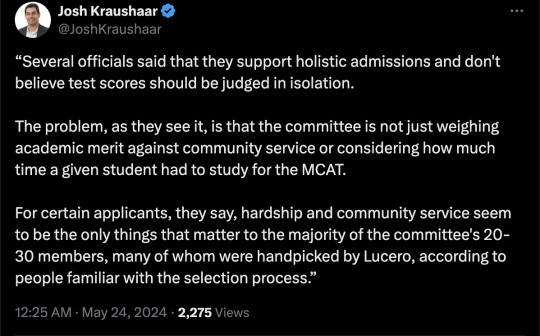
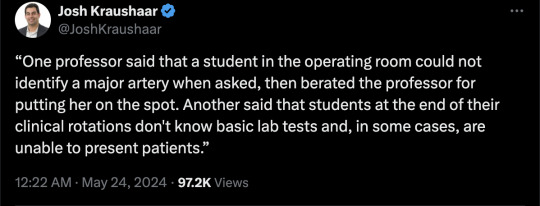
By: Aaron Sibarium
Published: May 23, 2024
Up to half of UCLA medical students now fail basic tests of medical competence. Whistleblowers say affirmative action, illegal in California since 1996, is to blame.
Long considered one of the best medical schools in the world, the University of California, Los Angeles's David Geffen School of Medicine receives as many as 14,000 applications a year. Of those, it accepted just 173 students in the 2023 admissions cycle, a record-low acceptance rate of 1.3 percent. The median matriculant took difficult science courses in college, earned a 3.8 GPA, and scored in the 88th percentile on the Medical College Admissions Test (MCAT).
Without those stellar stats, some doctors at the school say, students can struggle to keep pace with the demanding curriculum.
So when it came time for the admissions committee to consider one such student in November 2021—a black applicant with grades and test scores far below the UCLA average—some members of the committee felt that this particular candidate, based on the available evidence, was not the best fit for the top-tier medical school, according to two people present for the committee's meeting.
Their reservations were not well-received.
When an admissions officer voiced concern about the candidate, the two people said, the dean of admissions, Jennifer Lucero, exploded in anger.
"Did you not know African-American women are dying at a higher rate than everybody else?" Lucero asked the admissions officer, these people said. The candidate's scores shouldn't matter, she continued, because "we need people like this in the medical school."
Even before the Supreme Court's landmark affirmative action ban last year, public schools in California were barred by state law from considering race in admissions. The outburst from Lucero, who discussed race explicitly despite that ban, unsettled some admissions officers, one of whom reached out to other committee members in the wake of the incident. "We are not consistent in the way we apply the metrics to these applicants," the official wrote in an email obtained by the Washington Free Beacon. "This is troubling."
"I wondered," the official added, "if this applicant had been [a] white male, or [an] Asian female for that matter, [whether] we would have had that much discussion."
Since Lucero took over medical school admissions in June 2020, several of her colleagues have asked the same question. In interviews with the Free Beacon and complaints to UCLA officials, including investigators in the university's Discrimination Prevention Office, faculty members with firsthand knowledge of the admissions process say it has prioritized diversity over merit, resulting in progressively less qualified classes that are now struggling to succeed.
Race-based admissions have turned UCLA into a "failed medical school," said one former member of the admissions staff. "We want racial diversity so badly, we're willing to cut corners to get it."
This story is based on written correspondence between UCLA officials, internal data on student performance, and interviews with eight professors at the medical school—six of whom have worked with or under Lucero on medical student and residency admissions.
Together, they provide an unprecedented account of how racial preferences, outlawed in California since 1996, have nonetheless continued, upending academic standards at one of the top medical schools in the country. The school has consequently taken a hit in the rankings and seen a sharp rise in the number of students failing basic standardized tests, raising concerns about their clinical competence.
"I have students on their rotation who don't know anything," a member of the admissions committee told the Free Beacon. "People get in and they struggle."
It is almost unheard of for admissions officials to go public, even anonymously, and provide a window into confidential deliberations, much less to accuse their colleagues of breaking the law or lowering standards. They've agreed to come forward anyway, several officials told the Free Beacon, because the results of Lucero's push for diversity have been so alarming.
"I wouldn't normally talk to a reporter," a UCLA faculty member said. "But there's no way to stop this without embarrassing the medical school."
Within three years of Lucero's hiring in 2020, UCLA dropped from 6th to 18th place in U.S. News & World Report's rankings for medical research. And in some of the cohorts she admitted, more than 50 percent of students failed standardized tests on emergency medicine, family medicine, internal medicine, and pediatrics.
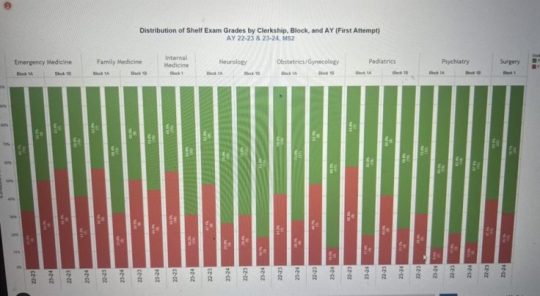
Those tests, known as shelf exams, which are typically taken at the end of each clinical rotation, measure basic medical knowledge and play a pivotal role in residency applications. Though only 5 percent of students fail each test nationally, the rates are much higher at UCLA, having increased tenfold in some subjects since 2020, according to internal data obtained by the Free Beacon.
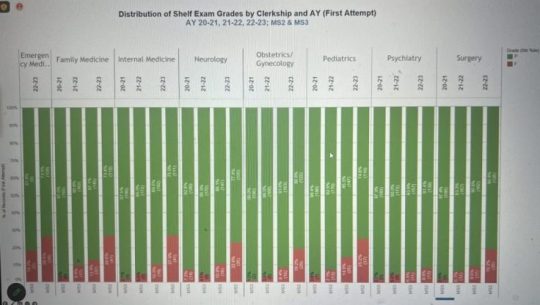
That uptick coincided with a steep drop in the number of Asian matriculants and tracks the subjective impressions of faculty who say that students have never been more poorly prepared.
One professor said that a student in the operating room could not identify a major artery when asked, then berated the professor for putting her on the spot. Another said that students at the end of their clinical rotations don't know basic lab tests and, in some cases, are unable to present patients.
"I don't know how some of these students are going to be junior doctors," the professor said. "Faculty are seeing a shocking decline in knowledge of medical students."
And for those who've seen the competency crisis up close, double standards in admissions are a big part of the problem. "All the normal criteria for getting into medical school only apply to people of certain races," an admissions officer said. "For other people, those criteria are completely disregarded."
Led by Lucero, who also serves as the vice chair for equity, diversity, and inclusion of UCLA's anesthesiology department, the admissions committee routinely gives black and Latino applicants a pass for subpar metrics, four people who served on it said, while whites and Asians need near perfect scores to even be considered.
The bar for underrepresented minorities is "as low as you could possibly imagine," one committee member told the Free Beacon. "It completely disregards grades and achievements."
Lucero did not respond to a request for comment.
Several officials said that they support holistic admissions and don't believe test scores should be judged in isolation. The problem, as they see it, is that the committee is not just weighing academic merit against community service or considering how much time a given student had to study for the MCAT. For certain applicants, they say, hardship and community service seem to be the only things that matter to the majority of the committee's 20-30 members, many of whom were handpicked by Lucero, according to people familiar with the selection process.
"We were always outnumbered," an admissions officer told the Free Beacon, referring to committee members who expressed concern about low grades. "Other people would get upset when we brought up GPA."
Lucero hasn't been kind to dissenters. Speaking on the condition of anonymity, six people who've worked with her described a pattern of racially charged incidents that has dispirited officials and pushed some of them to resign from the committee.
She has lashed out at officials who question the qualifications of minority candidates, five sources said, suggesting naysayers are "privileged," implying that they are racist, and subjecting them to diversity training sessions.
After a Native American applicant was rejected in 2021, for example, Lucero chewed out the committee and made members sit through a two-hour lecture on Native history delivered by her own sister, according to three people familiar with the incident. No applications were reviewed that day, an official present for the lecture said.
In the anesthesiology department, where Lucero helps rank applicants to the department's residency program, she has rebuffed calls to blind the race of candidates, telling colleagues in a January 2023 email that, despite California's ban on racial preferences, "we are not required to blind any information."
That alone could get UCLA in legal trouble, according to Adam Mortara, the lead trial lawyer for the plaintiffs in Students for Fair Admissions v. Harvard, the Supreme Court case that outlawed affirmative action nationwide.
Asking for information about an applicant's race when "no lawful use can be made of it" is "presumptively illegal," Mortara said. "You can't have evidence of overt discrimination like this and not have someone come forward" as a plaintiff.
Lucero has even advocated moving candidates up or down the residency rank list based on race. At a meeting in February 2022, according to two people present, Lucero demanded that a highly qualified white male be knocked down several spots because, as she put it, "we have too many of his kind" already. She also told doctors who voiced concern that they had no right to an opinion because they were "not BIPOC," sources said, and insisted that a Hispanic applicant who had performed poorly on her anesthesiology rotation in medical school should be bumped up. Neither candidate was ultimately moved.
Lucero's comments from the meeting were flagged in an email to UCLA's Discrimination Prevention Office, which has received several complaints about her since 2023, emails show. The office has declined to act on those complaints on the grounds that they aren't "serious enough" to merit an investigation, according to a source with direct knowledge of the situation. The Discrimination Prevention Office did not respond to a request for comment.
The focus on racial diversity has coincided with a dramatic shift in the racial and ethnic composition of the medical school, where the number of Asian matriculants fell by almost a third between 2019 and 2022, according to publicly available data. No other elite medical school in California saw a similar decline.
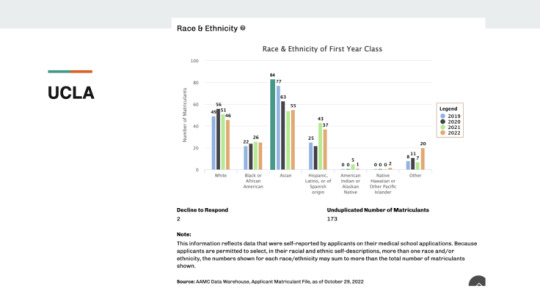
As the demographics of UCLA have changed, the number of students failing their shelf exams has soared, trends professors at the medical school say are connected.
Between 2020, the year Lucero assumed her post, and 2023, when the first classes she admitted were taking their shelf exams, the failure rate rose dramatically across all subjects, in some cases increasing tenfold relative to the 2020 baseline, per internal data obtained by the Free Beacon.
"UCLA still produces some very good graduates," one professor said. "But a third to a half of the medical school is incredibly unqualified."
The collapse in qualifications has been compounded by UCLA's decision, in 2020, to condense its preclinical curriculum from two years to one in order to add more time for research and community service. That means students arrive at their clinical rotations with just a year of courses under their belt—some of which focus less on science than social justice.
First-year students spend three to four hours every other week in "Structural Racism and Health Equity," a required class that covers topics like "fatphobia," has featured anti-Semitic speakers, and is now the subject of an internal review. They spend an additional seven hours a week in "Foundations of Practice," which includes units on "interpersonal communication skills" and, according to one medical student, basically "tells us how to be a good person." The two courses eat up time that could be spent on physiology or anatomy, professors say, and leave struggling students with fewer hours to learn the basics.
"This has been a colossal failure," one professor posted in April on a forum for medical school applicants. "The new curriculum is not working and the students are grossly unprepared for clinical rotations."
Nearly a fourth of UCLA medical students in the class of 2025 have failed three or more shelf exams, data from the school show, forcing some students to repeat classes and persuading others to postpone a different test, the Step 2 licensing exam, that is typically taken in the third year of medical school and is a prerequisite for most residency programs.
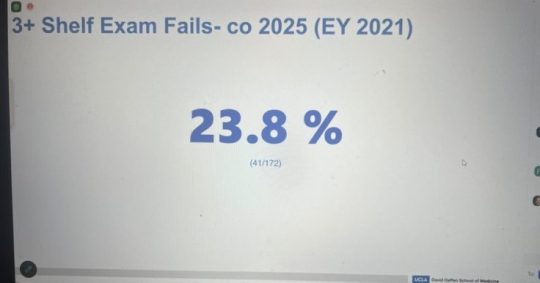
Around 20 percent of UCLA students have not taken Step 2 by January of their fourth year, according to the data. Ten percent have not even taken the more basic Step 1—an "extremely high number," one professor said, that will force many students to extend medical school.
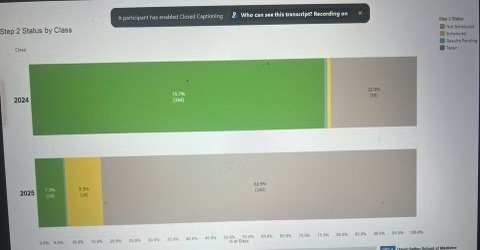

"It's a combination of a bad curriculum and bad selection," another professor said, referring to the admissions process. Some students are accepted with GPAs so low "they shouldn't even be applying."
UCLA did not respond to a request for comment.
As medical schools around the country adjust to the Supreme Court's affirmative action ban, the experience of UCLA offers a preview of how administrators may skirt the law and devise public-spirited excuses for violating it.
Lucero has told the admissions committee that each class should "represent" the "diversity" of California, including its remote and rural areas, so that graduating students will return to their hometowns and beef up the medical infrastructure there, officials say.
Race is rarely mentioned outright, and unlike the committee for anesthesiology residents, the committee for students does not see the race or ethnicity of applicants.
Instead, officials say, Lucero uses proxies like zip codes and euphemisms like "disadvantaged" to shut down criticism of unqualified candidates, citing a finding from the Association of American Medical Colleges that, technically, most students with below-average MCATs make it to their second year of medical school. How well they do after that point goes undiscussed and undisclosed.
"We have asked for metrics on how these folks actually do," one committee member said. "None of that is ever divulged to us."
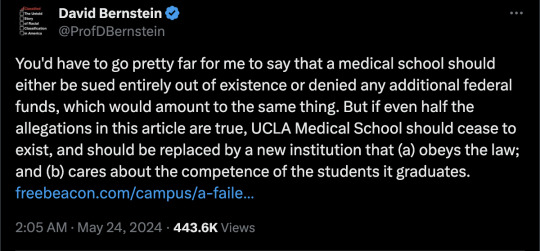
==
Hope your next doctor isn't from UCLA.
Wokeness has a body count.
#Aaron Sibarium#UCLA#Jennifer Lucero#medical school#medical corruption#ideological corruption#ideological capture#higher education#corruption of education#academic corruption#academic scandal#dangerously unqualified#affirmative action#race based admission#racial discrimination#woke schools#woke#wokeness#cult of woke#wokeism#wokeness as religion#DEI doctors#diversity#equity#inclusion#diversity equity and inclusion#religion is a mental illness
12 notes
·
View notes
Text



solani's workday was shaping up to be one of her best. she performs another surgery, this time with kingston. zoe also announces the engagement at last & gives solani her invitation to attend. and kingston informs her that he felt she was ready to take the SMAT to officially become a doctor.
#smat = sims medical admission test lmaoo. obviously not how it works irl but it's how it works in my simuniverse!#simblr#the sims 4#the sims#sims 4#ts4#ts4 gameplay#sims 4 gameplay#sims 4 story#the sims gameplay#sims 4 screenshots#errantcesims#solani brown
7 notes
·
View notes
Text
if someone was to look they could probably find a small collection of posts about wanting to get married starting to compile on my blog. @ self mate you don't go out and neither do you talk to people + L + how do you think one gets in a relationship even. what do you do successfully. quickly
10 notes
·
View notes
Text
*grabbing fanfic authors by the shoulders and shaking them around* listen. listen. pre-law is not a major. do you hear me? can you hear me? listen !!!
#'im studying pre law' there are no pre reqs for american law school#'pre med' refers to the courses required for admission to medical school that typically results in a biology degreee#you can get a degreee in fuck all and go to law school#mumbles#this is such a stupid pet peeve lmao
17 notes
·
View notes
Text
doing mcat diagnostic wish me luck
3 notes
·
View notes
Text
god my body is SO tuned to calendar rhythms. guess what somatic memories just started floating back up? that's right! the ones from my time getting IV fluids!! my months and months and months of getting stabbed with needles which my nurses were very very very good at but still, unfortunately, SUCKED SO BAD.
#local birb opens beak#i have such a BEASTLY somatic memory#hello needle memories#medical trauma#tw needles#needles#idk how i got through that November admission tbh#maybe bc it hadnt been that long#and the blood draw not that long ago#god i just
3 notes
·
View notes
Text
I cannot relate when people talk about being unable to distinguish comorbid symptoms, at least not to the same degree. I have mine fairly parsed, including where they overlap and exacerbate each other, in part because of how aggressively I've pursued treatment while also staggering it in such a way that allowed me and my psychs to identify the separate disorders.
#this isnt anti self diagnosis either#i correctly self diagnosed before getting actually diagnosed#idk i approached my mental health treatment like a virgo enneagram one for lack of a more succinct way of saying#“aggressively and with a hyperfocus on self improvement”#sometimes i assume what im doing is average and then my mental health team reminds me that no i am Atypical#i will never forget telling my therapist i should stop saying im built different#and her replying with “normally i would agree but... well....”#also im CONSTANTLY learning new things about myself and my conditions#this isnt to imply i have everything figured out#if im ever not learning anything new about myself then im stagnating#nor is it like implying there's a right or wrong way to go about this sort of thing#it's just an observation and an admission that i often cant relate to a lot of posts and convos even about my specific diagnoses#the amount of times people with my same illnesses have attempted to neurotypical karen me or who have implied i dont really have them#is Many#like more than youd think and in both irl and online spaces#generally over innocuous things but all because they dont think im expressing my illnesses right#and the fact of the matter is ive had medical professionals tell me that while my symptoms are textbook - how i express them isnt always#it's a neutral observation but one that sometimes leaves me like a little out of my depth in more general convos about mental illnesses
2 notes
·
View notes
Text
Advantage of Studying MBBS in Russia

Studying medicine is a significant decision, and choosing the right place to pursue your MBBS is crucial. Russia has emerged as a popular destination for medical education, offering numerous advantages to students seeking a quality medical degree. In this guide, we'll explore the benefits of studying MBBS in Russia in simple terms, along with its potential impact on your future career.
1. Affordable Education: Studying MBBS in Russia is budget-friendly. Compared to other countries, the tuition fees and living costs are reasonable. This means you can pursue your dream of becoming a doctor without worrying too much about financial burdens.
2. High-Quality Education: Russian medical universities are known for their excellent education standards. They follow international guidelines, ensuring that the education you receive is top-notch. With a degree from Russia, you'll be well-prepared for a successful career in medicine.
3. Diverse Environment: Studying MBBS in Russia exposes you to a diverse environment. You'll meet students from various backgrounds and cultures. This multicultural setting enriches your experience and helps you develop a global perspective, essential for a career in medicine..
4. Language Options: While Russian is the primary language, many universities offer MBBS programs in English. This is beneficial for international students who may not be fluent in Russian. Learning Russian alongside your studies can also be advantageous for your future medical practice.
5. Strong Academic Tradition: Russia has a rich history of excellence in medical education and research. Many medical breakthroughs have originated from Russian institutions. By studying in Russia, you become part of this legacy, gaining access to valuable academic resources and opportunities.
6. Straightforward Admission Process: Applying to study MBBS in Russia is simple. The admission process typically involves submitting academic documents and other required paperwork. Unlike some other countries, you may not need to sit for entrance exams, making the process smoother.
Studying MBBS in Russia offers numerous benefits, including affordability, quality education, global recognition, and exposure to a diverse environment. With modern facilities, a strong academic tradition, Russia provides an excellent platform for aspiring medical professionals to fulfill their dreams.
#Study medicine in Russia#Advantages of MBBS in Russia#Russian medical universities#MBBS in Russia#Admission process for MBBS in Russia#Top ranking Govt. Universities in Russia
2 notes
·
View notes
Text
#Study MBBS in Bangladesh#MBBS Admission in Bangladesh#Medical Education in Bangladesh#Benefits of Studying MBBS in Bangladesh#MBBS in Bangladesh for Indian Students#Study MBBS in Bangladesh to Save Money#Save Time and Money by Studying MBBS in Bangladesh#Save Time and Money Studying MBBS in Bangladesh#Study MBBS in Bangladesh for International Students
2 notes
·
View notes
Text
I am so glad to be home from the hospital
My cats are very happy to have me home as well
And my husband—even more so
I am not so glad about the added trauma that came home with me. I knew it was inevitable, but that doesn’t make it any easier.
9 days in the hospital—which translates to 9 days of constant respirator usage, holding my breath for temperature checks, small sips of water, mouthwash, and hoping that I wasn’t exposed to anything when I was vomiting or dry heaving.
4 days on PPN
3 infiltrated IVs (1 of which may have caused permanent damage to a vein from PPN)
And the beginnings of a Chiari/Tethered Cord flare to top it all off.
I’m not even able to go into more detail at the moment because I was heavily dissociated the entire time and haven’t met the new parts yet.
#cw vomit mention#cw emetophobia#cw trauma mention#cw trauma discussion#cw medical trauma#I know I have more to say but I’m not able to access that right now#dissociation adds a whole different level too#I was trying to explain what it felt like to my husband last night because I was not the one fronting while we were in the hospital#my last memory was being discharged from the first ER visit#I don’t even remember going back to the ER that night even though I know I did and ultimately ended with admission#the best analogy I have to explain it is the feeling of getting knocked out and thrown in the trunk of a moving car#It’s jarring to lose a full 9 days#dissociative identity disorder#osddid#medical#disabled#olive blogs#signed: Annie
2 notes
·
View notes